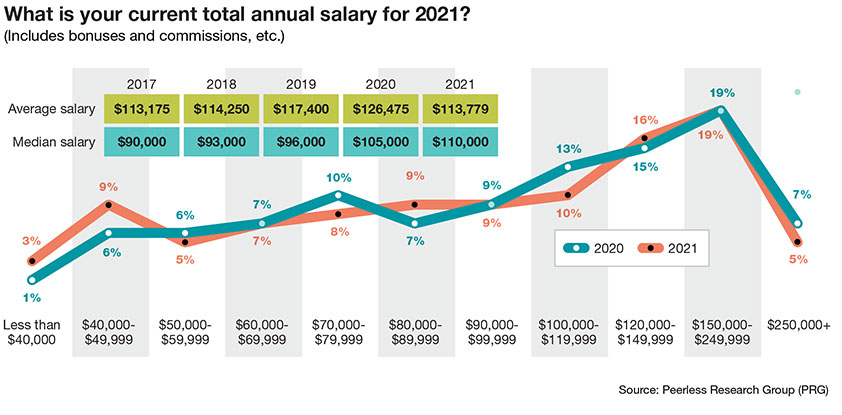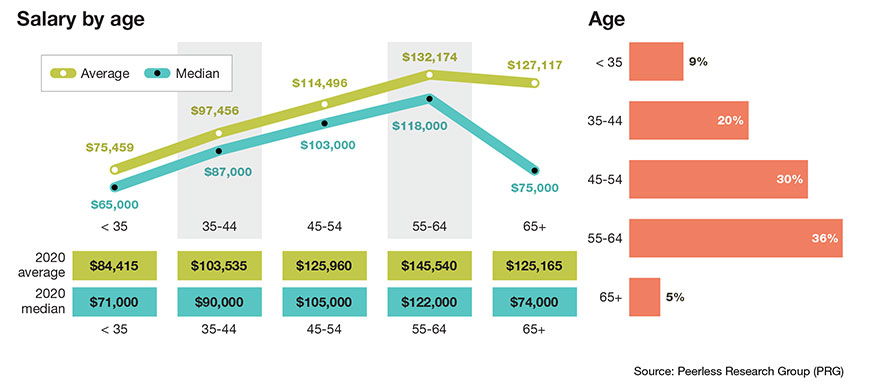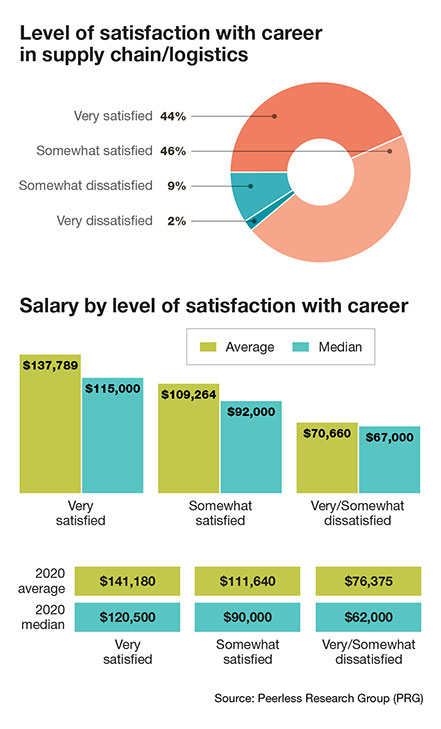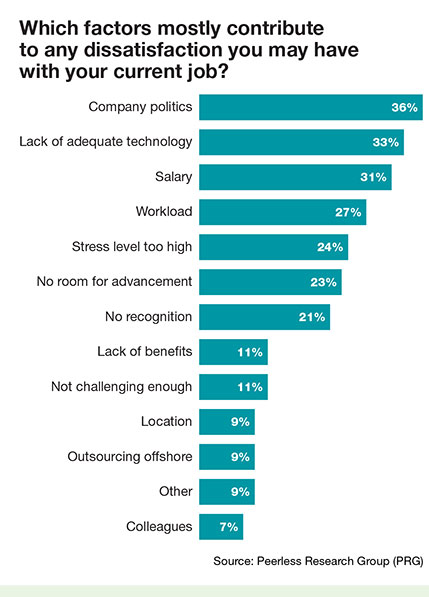37th Annual Salary Survey: Salaries level-off
Given the number of managers furloughed without pay during the first part of the pandemic, analysts were hardly surprised that salaries remained fairly stagnant in 2020. At the same time, our survey reveals a resiliency pointing to raises in this year of recovery.
Nearly 400 logistics professionals made the time to participate in our annual salary survey this year, with many of them still working virtually from home offices. Our analysts at Peerless Research Group (PRG) note that while career paths may have been diverted due to pressures of quarantine, most survey respondents remained upbeat about the future.
“Thanks to unemployment benefits and government relief checks, most managers seemed reconciled to the flattening salary picture,” says Brian Beaudette, director of research at PRG. “What impressed us most was the confidence reflected in a rebound.”
Almost half of this year’s respondents reported increased salaries, but in keeping with the previous salary observations, this is less than the previous year, when 62% reported a salary increase. Only 9% experienced a decrease, which is good news in a tough year.
As might be expected, there’s a steep slope upwards for age of survey respondents. This year, 71% of respondents are age 45 and over and only 25% of respondents were women. Given the age of the sample, this is no great surprise, observes Beaudette.
“There also no surprise that the number of functions performed by survey respondents increased over the past two years to three years,” says Beaudette. “This trend will continue. Logistics management is in the news every day, and for good reason. Economic shifts toward more efficient distribution and traceability, and a realization of the importance of taking a more holistic, systems-level perspective on the whole ecology of businesses has only just begun.”

More for less
Technology makes it easier for companies to put more functions under fewer managers, and few leaders have the insights into the overall business that logistics managers have.
This year, the number of respondents who considered themselves “highly knowledgeable” in e-commerce and e-fulfillment has actually gone down, albeit slightly—38% and 39% in 2019 and 2020, respectively, and 35% in 2021. The percentage of respondents who consider themselves “somewhat knowledgeable” has slightly increased from 52% in 2019 to 54% in 2021.

“This no doubt reflects some the harsh realities of a year that witnessed an unprecedented growth in e-commerce and e-fulfillment,” says Michael Gravier, associate professor of marketing and supply chain management at Bryant University. “There’s nothing like being thrown into the deep end of the pool to make you doubt your swimming skills.”
Gravier adds that as e-commerce and e-fulfillment become more competitive and sophisticated, we might see the percentage of “highly knowledgeable” go down for another few years. Despite these new fulfillment challenges and the fact that many are doing more for less, most respondents are happy with their jobs. In fact, 38% say they’re happy where they are, while 32% say they’re always open to opportunities.

“The level of satisfaction with the career in logistics is very high, with 44% very satisfied and 45% somewhat satisfied,” Gravier notes. “This would be expected given the demographics of the respondents. We find a lot of career professionals who have been in the industry for decades, and even in a challenging year, there must be some satisfaction derived from the fact that logistics management is now in the news, and society realizes more than ever its importance.”
Intrinsic motivation
By a significant margin, the root of the sense of satisfaction with the job seems to be intrinsic motivation, with most respondents citing “feeling of accomplishment” as the factor that most greatly affects their satisfaction with their job. Next come the practical—and required—benefits, job security and salary, followed closely by relationship with colleagues.
 Curiously, only 22% cited advancement opportunities as a factor in job satisfaction, although this might reflect the seniority of most respondents who are close to reaching the end of upward mobility. Job dissatisfaction factors include “politics” and lack of adequate technology.
Curiously, only 22% cited advancement opportunities as a factor in job satisfaction, although this might reflect the seniority of most respondents who are close to reaching the end of upward mobility. Job dissatisfaction factors include “politics” and lack of adequate technology.
Jim Baehr, a partner with the supply chain consultancy Sourcing Strategies Group, notes that the “somewhat satisfied” response may indicate that managers may be uncertain as to what the future holds for careers as well as salaries.
“Job security seems to be the overriding concern,” says Baehr. “This may be made worse by remote working where managers are even more removed from corporate leadership. When you are out of sight, you may be out of mind. And this causes some anxiety about being politically engaged while working in a virtual environment.”
Sara Gordon, head of customer success at Adecco USA, a division of a global human resources firm, says compensation often ranks among the top three for employee satisfaction and retention. “Logistics management roles are in high demand and crucial, not just to organizations, but also to the U.S. economic recovery,” she says. “Employers should be prepared to offer a competitive salary and consider total compensation options, like bonuses and relocation packages, in order to attract top logistics talent.”
Because PRG data shows that only 5% of respondents are actively searching for a new role, employers may need to work hard to entice logistics managers to explore new job opportunities. “Today’s logistics talent wants to work for a leader or company they believe in,” says Gordon. “So, employers need to evaluate their employee value proposition and make sure their mission and values are clear and consistently communicated across the organization.”
Based on this year’s survey, 57% maintain that the “feeling of accomplishment” is what most greatly affected their satisfaction at their current job. Gordon says that employers can appeal to this group—that tends be a little younger—by speaking to their company’s greater contributions, such as how they deliver social impact in their community. In fact, 82% of respondents say that they’re seeing or expect to see younger managers enter the logistics management workforce over the coming year.
“With this in mind, employers should consider investing in ‘upskilling’ programs in order to attract high-potential talent and train them on the job,” observes Gordon. “It’s clear that this year’s respondents feel that boosting their knowledge of technology and related skills will help them attain a higher salary. As continuous learning will be crucial to managers at all tenures, organizations can retain workforce talent and meet their future needs by equipping them with these skills.”
Career advancement
As might be expected for a career field that has a history of respect for experience and hands-on expertise, remarkably few survey respondents have college degrees.
 Only about half have a bachelor’s degree or graduate degree, while only about a third of respondents have completed any formal education in logistics. According to Gravier, this is the pioneering generation of logistics leaders that came before most degree programs existed. “And no doubt this generation will replace itself with the up-and-coming generation of college graduates who have discovered the challenges and promise of a career in logistics management,” he says.
Only about half have a bachelor’s degree or graduate degree, while only about a third of respondents have completed any formal education in logistics. According to Gravier, this is the pioneering generation of logistics leaders that came before most degree programs existed. “And no doubt this generation will replace itself with the up-and-coming generation of college graduates who have discovered the challenges and promise of a career in logistics management,” he says.
The factors most important to advancing their careers reflect the low emphasis on education, with 49% citing their “personal and social network” compared to 28% citing “taking classes” or “getting a degree.” This doesn’t mean that education doesn’t matter, as those with MBAs are the highest paid, but rather reflects the importance of personal relationships and interpersonal collaboration in logistics management.
This year, 75% of respondents say they’ve completed job-related training, and another 54% got education through industry conferences, seminars and workshops. Our analysts expect this trend to continue, as more companies are developing training and even in-house universities. Workforce development has become a key competitive advantage, and technology is only as useful as the hands that are putting it to use.
None of the preceding indicates that logistics managers fail to appreciate training and education. Indeed, 42% plan to take a continuing education program or class, despite the fact that 36% think it won’t lead to a better salary. They are clearly professionals committed to learning new skills and refining existing skills for their field.
As salaries go up, naturally the more strategic the skills become. Everyone making more than $50,000 cited the need for financial understanding and analysis, as logistics managers justify their initiatives based on the numbers.
Social networking
In light of the emphasis on personal and social networking, it’s interesting that electronic social networks dominate the sources most helpful for learning more about opportunities for better paying jobs—63% compared to only 48% for word of mouth.
And as job searches continue to shift to online, one might expect other aspects of job seeking to also move in order to make the whole process more efficient. For this reason, industry experts expect more certifications and credentials that are verified via electronic social networks to become more important in the future.
 However, it’s important to note that not everyone is looking, says Farrah Salim, senior principal analyst at Gartner. “Approximately 72% of respondents have had three or less employers throughout their careers,” she says. “This indicates to me that organizations are making headway in retaining logistics management talent. Companies have numerous strategies, but to see this type of response indicates that those efforts are quite effective.”
However, it’s important to note that not everyone is looking, says Farrah Salim, senior principal analyst at Gartner. “Approximately 72% of respondents have had three or less employers throughout their careers,” she says. “This indicates to me that organizations are making headway in retaining logistics management talent. Companies have numerous strategies, but to see this type of response indicates that those efforts are quite effective.”
On a final note, analysts agree it’s encouraging that 75% of survey respondents would recommend the logistics management field to their son, daughter or to a friend. There can be no stronger endorsement of this vibrant, thriving career field.
Credential advantage
Michael Gravier, an associate professor of marketing and supply chain management at Bryant University, says that while there’s an “undertone of disillusionment” among many college students today, the value of a degree will continued to be a key salary differentiator.
“The economy and the relatively easy prosperity of previous generations seem to be diminishing, and the bar for starting a career has been elevated,” says Gravier. “While many of this year’s salary survey respondents didn’t need a bachelor’s degree to have a well-paid and satisfying career, college students laugh at the ‘entry level’ job ads they see requesting five years to 10 years of experience, a college degree—and sometimes a graduate degree.”
Gravier adds that many college students will not see the same value in the social networking that the survey respondents do.
“This isn’t because they don’t engage in networking and social relationships,” Gravier says. “In fact, it’s quite the opposite. These students have been networking and collaborating since a young age. They take it for granted, and they solve many of their problems by reaching out to their networks. For this reason, they will also be harder to keep satisfied with low-ball salaries and benefits because it’s too easy for them to compare those things.”
According to Gravier, college students these days tend to collect certifications and other outward signs of accomplishment and expertise. They’ve been taught that they must show what they can do from a young age. Many students these days graduate with multiple ribbons and other decorations on their graduation caps and gowns.
Colleges increasingly focus on helping students to demonstrate skills and proficiencies, such as helping them to get their Six Sigma or SAP certifications before they graduate. It’s a competitive job marketplace, and colleges are in intense competition to show which most helps their graduates.
“The disappointment begins when they graduate, as they don’t always succeed at negotiating the salaries they believe are commensurate with the accomplishments they have, and they often have more certificates than older workers,” adds Gravier. “Once they’re hired, they tend to be promoted quickly, as a little experience goes a long way when you have such a deep well of training and education

Article Topics
Warehouse News & Resources
The Ultimate WMS Checklist: Find the Perfect Fit 40th Annual Salary Survey: Salary and satisfaction up Data Capture: Bar coding’s new companions Salary Survey: Pay, satisfaction, youth on the rise Examining the impact of the Taiwan earthquake on global supply chain operations Reverse Logistics: Best Practices for Efficient Distribution Center Returns Exploring Customized Forklift Solutions More WarehouseLatest in Logistics
LM Podcast Series: Assessing the freight transportation and logistics markets with Tom Nightingale, AFS Logistics Investor expectations continue to influence supply chain decision-making The Next Big Steps in Supply Chain Digitalization Warehouse/DC Automation & Technology: Time to gain a competitive advantage The Ultimate WMS Checklist: Find the Perfect Fit Under-21 driver pilot program a bust with fleets as FMCSA seeks changes Diesel back over $4 a gallon; Mideast tensions, other worries cited More LogisticsAbout the Author
Subscribe to Logistics Management Magazine

Find out what the world's most innovative companies are doing to improve productivity in their plants and distribution centers.
Start your FREE subscription today.
April 2023 Logistics Management

Latest Resources
















